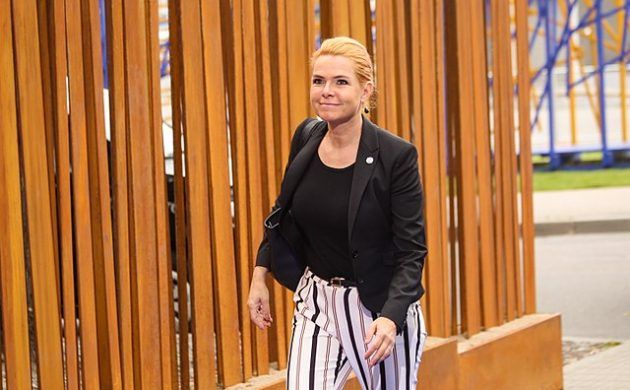Some 26 ‘judges’ are currently convening at a preparatory hearing at Parliament ahead of the impeachment trial of the former immigration and integration minister, Inger Støjberg, which starts at the Supreme Court on September 2.
Technically, only 13 are Supreme Court judges. The other 13 have been sourced from the country’s political parties – as is custom in such cases, although it has been 26 years since a case like this has reached this stage.
Støjberg is chiefly charged with violating her ministerial responsibility by “initiating and maintaining” the separation of asylum couples in which one of the parties was under the age of 18. Additionally, she is further accused of giving incorrect information to Parliament at four consultations in 2017.
Lots of decisions today
The meeting today will make a number of decisions in relation to the case.
Firstly, it will decide whether the 26 judges are competent enough to perform their duty.
Secondly, it will decide whether the case will be televised – initially today’s proceedings, but potentially the whole trial.
And thirdly, it will decide whether to approve the charge sheet as it stands, or make adjustments – most likely by removing certain wording.
36 days in court … or something much shorter
The charge sheet is currently being debated now, and the outcome will have a major bearing on how long the case will last.
Støjberg’s lawyers are arguing that the additional charges relating to her misleading Parliament should be dropped.
A hefty 36 court days have been allocated, with a judgement by Christmas, but this could change today if the charge sheet is radically altered today.
Youngsters increasingly driving whilst intoxicated
The number of newly-qualified drivers using their vehicles whilst intoxicated has doubled in the space of just one year. According to a Rådet for Sikker Trafik survey, 15 percent of drivers aged 17-24 drove whilst over the limit last year, compared to 8 percent in 2019. Michelle Laviolette from Rådet for Sikker Trafik said the figures were particularly concerning as the age group is the most likely to drive dangerously and cause accidents. And the casualty numbers for 2020 bear this out, as they were considerably higher than in the period from 2015-19. Some 5 percent of the respondents confessed to doing it more than once, while a further 3 percent did not know whether they had driven over the limit.
Why the forthcoming Tech for Democracy conference matters
At Tech for Democracy, a high-level conference in Copenhagen on November 9, key players from industry, government and civil society are expected to work purposefully to promote digital resilience, democracy and human rights online. And in the build-up to the conference, both the Foreign and Development Ministries have confirmed they will be working hard to ensure that democracy emerges from 2021 stronger than ever. Digital technologies offer autocratic regimes new opportunities to oppress, monitor, censor and control people, they acknowledge, so it will be important to address this at the conference. “Just look at Lukashenko’s Belarus, where the internet is being shut down to stifle democratic voices. Look across the Atlantic, where hateful rhetoric on social media contributed to the onslaught of Congress,” commented the foreign minister, Jeppe Kofod. “Or think that a few tech giants have also gained too much power over the democratic debate on social media here at home. With Tech for Democracy, Denmark is at the forefront of the global value struggle and is helping to ensure democracy in the digital age.”
Boost for fishing industry as Brexit relief funds are guaranteed for Denmark
Denmark is set to receive 2 billion kroner from the EU’s Brexit reserve, which will be distributed to various industries struggling since the UK’s exit – most notably the fishing sector. The funds will be allocated by the end of 2023, with the fishing industry receiving 1.136 billion and other trade 850.9 million. “I am naturally pleased that the framework is now in place. Danish fisheries are in a very tiring situation after the UK chose to opt out of the EU. Now we in Parliament must ensure that the Danish fishermen do well on the other side,” commented the minister for food, agriculture and fisheries, Rasmus Prehn. “Many have certainly wanted even more. Especially in the fishing industry. But I think the overall is positive. It is crucial that we create the right model for how we can convert Danish fisheries to the new reality, where we strengthen both the industry and the marine environment.”
Parliament approves funding to produce green hydrogen
A political agreement has secured 850 million for the development of green fuels in the future, according to the Ministry of Climate, Energy and Supply. The development of Power-to-X technologies will enable the large-scale conversion of green power into hydrogen and other sustainable fuels that can be used in ships, aircraft and heavy goods – not just in Denmark, but in the EU, as the funds will be allocated to a pan-European project. The production of green hydrogen, IPCEI, is thought to have huge potential.
Raw material extraction increasing
More raw materials were taken from the ground in Denmark in 2020 compared to the previous year, according to figures released by StatBank and analysed by Danmarks Statistik. This was reflected in the revenue accrued from the extraction, which came to 33.2 million kroner – an increase of 12 percent. Sand, stone and gravel accounted for 83 percent of the volume, with chalk and lime accounting for 9 percent.















